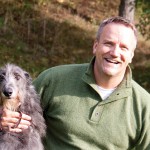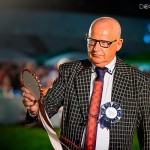Interview with Mr. Javier Sanchez • Interviewed by R. Rauherz
Published in Best in Show Summer 2012
BIS: Buenas tardes, Sr. Sanchez! Thank you for taking the time to do this interview with us. You have recently judged a huge entry of French Bulldogs at the Talavera Show in Spain. At this show the dogs compete for the obligatory point that is necessary to become a Spanish Champion.
What is your background in dogs? How did you get started?
J.S.: I started in the 70ies, back then I worked as a ring steward and assisted the judges, mostly British judges that were assigned to judge in Madrid. My main motivation has always been to improve things, because I disapproved of a lot of things.
BIS: Which breed did you start out with? Do you still have a favorite breed?
J.S.: As an exhibitor I first started with Terriers, imports from England. First Scottish Terriers and then Bull Terriers, during the time of Mr Raymond Oppenheimer. I‘ve definitely come from Terriers, I‘ve also founded the Spanish Terrier Club in the 70ies in Madrid.
In the late 70ies I discovered the „real“ GIant Schnauzer from Germany, when they still had great dogs in Germany. I imported the first ones to Spain and founded the Spanish Schnauzer Club. I had Schnauzers in both colors, black and salt & pepper, and bred the best dogs for many years.
BIS: Do you have a favorite show?
J.S.: Recently things have changed a bit, but I still remember the Helsinki Winner Show as one of the most important shows worldwide, the second biggest show after Crufts.
Another show with a special touch is the Eurodogshow in Kortrijk. (I was assigned to judge BIS there last year and I gave it to an Afghan Hound from Great Britain.) It is a very special show. The organization is very professional, and they don‘t make the mistake of assigning only all rounders as judges, which is a stupid habit at most of today‘s shows. Instead they invite breed specialists for every breed. It is the only show on the continent, that draws a good entry of very nice British dogs, which to me is very important.
BIS: Is there a country you love traveling to as a judge?
J.S.: Since I‘m Spanish I love to travel to South America to judge, although due to the show system they have there it can be hard work.
BIS: Are there shows or countries that you have not yet been invited to as a judge, but that sound enticing to you?
J.S.: Not really. I have been judging in about 70 countries on all five continents. I have even been to countries that are not exactly tourist destinations like Papua New Guinea. They don‘t have any shows over there anymore.
BIS: What was your greatest experience as a judge? Do you have any funny memories?
J.S.: Funny memories?!?!?!?! Hundreds! I could write several books about them, but where is the editor? One worth mentioning would be the international show in Casablanca, Morocco, when the country became a member of the FCI. We were only supposed to judge the Reserve BIS because the BIS was „pre-awarded“ every year to the dog of the Princess (King Hassan‘s sister), a giant Chihuahua. After spending all day trying to select dogs, group by group, all 300 specimen that were entered were called ino the Reserve BIS-ring “beause all of them paid the same and have the same rigths”!!! The Reserve BIS-ring was like a street market full of coca-cola and water and cigarretees vendors, and everybody was smoking and talking to eachother like in the main square of their village, and when we tried to tell somebody, „would you plase move the dog up and down for me, please?”, they got mad because we interrupted their conversation with their friends.
BIS: Who was the best dog that you have ever judged and why?
J.S.: Many. Every dog that gives me goose bumps and makes me forget abot everything around me is worth being remembered. If you spot THE dog in the ring, everything else ceases to exist. It‘s a magic moment and very intense.
BIS: What characteristics make a good judge in your opinion?
J.S.: Honesty. Passion for being a judge. It‘s a vocation. A practical education and profound knowledge about dogs. Experience as a breeder. Humaneness. An eye for what is important.
BIS: Are there colleagues that you regard very highly?
J.S.: I have always been involved with dog show people from the UK, that‘s where I started and that‘s where my idols come from. If I have to name one, then it would be Joe Carlidge. Just to watch him do his job has changed my life and inpsired me to follow my vocation. I know about 10.000 judges worldwide. I talk to them, I listen to them, I study them. The rapid changes in the world of dog shows hasn‘t helped regarding the selection and the evolution of certain breeds. The excess of judges without adequat education hasn‘t either.
BIS: How has the dog show scene changed over the last decades?
J.S.: A lot, mostly for economic reasons. I have even judged dogs at a show in Mongolia, where the shows are better than in many parts of Europe. I don‘t like the forced, rapid changes that we are facing at the moment. Everything is very easy today. High volume breeding, dozens of shows, bad judges, all this contributes to the decrease in type and health in many breeds.
BIS: How did you become involved with French Bulldogs?
J.S.: I got involved with French Bulldogs 14 years ago. After all these years of breeding and working with big breeds like the Giant Schnauzers and Akitas I got a little tired and I had already accomplished everything with them. I discovered how intelligent the French Bulldogs are, that they are very sweet companions and that they are easy going dogs, that‘s why I chose them immediately. I have done well with my breeding and I don‘t regret getting into the French Bulldogs.
BIS: What do you like about this breed?
J.S.: Like I said I like their intelligence, temperament, their face and expression that can communicate all their feelings (for me a breed is all about type and expression), and their ability to be a great pet no matter what kind of lifestyle you have.
BIS: Which dogs do you consider your foundation?
J.S.: I started with Danish lines, and I worked on the development of two different bloodlines, which allows me to continue with my breeding for many years without having to rely on dogs outside of my breeding program. Although I have also brought in some Russian dogs and a marvelous bitch from the UK.
BIS: Has the breed undergone changes in the last few years? For better or for worse?
J.S.: No, it‘s a stable breed, although the type is different depending on the country where the dog was bred. The standard unfortunately allows for a lot of personal interpretation, that‘s why the breed isn‘t homogenous.
BIS: Is it difficult to breed a good French Bulldog? What is your secret to success?
J.S.: It is difficult. Two plus to isn‘t always four, and champions don‘t always produce champions. You have to breed with „clean“ bloodlines, avoid exaggerations, and if you buy one, choose a breeder who breeds within a club that has control over its breeders and forces them to health test their dogs. In my breeding I‘m giving a lot of credit to the grandparents, when a nice litter is born. Before you have ten years of experience under your belt you don‘t know anything.
BIS: Do you see it as an advantage to breed more than one breed?
J.S.: That depends on your lifestyle. If you have a family to help, possibilities and talent, why not breed more than one ?
BIS: Are you mentoring any newcomers?
J.S.: I prefer not to. I help them in the ring if they deserve it. That‘s all.
BIS: Do you still have goals you want to achieve? Which ones?
J.S.: I am a journalist. I have a long list of what I want to write, if I have the chance I want to publish it. 🙂
BIS: Thank you, Mr. Sanchez, for taking the time to answer our questions. Próspero Ano Nuevo!
J.S.: You‘re welcome!



